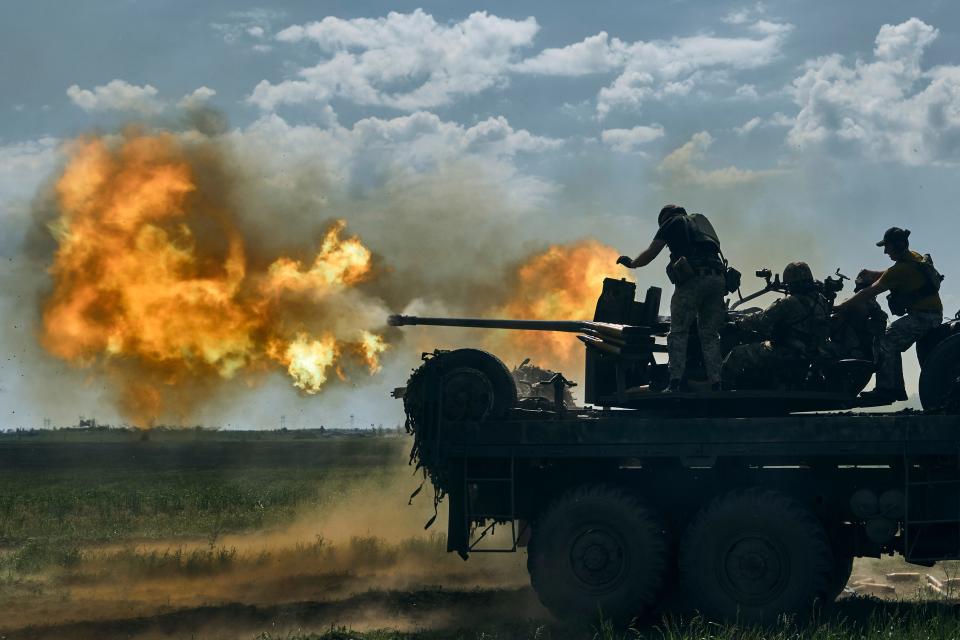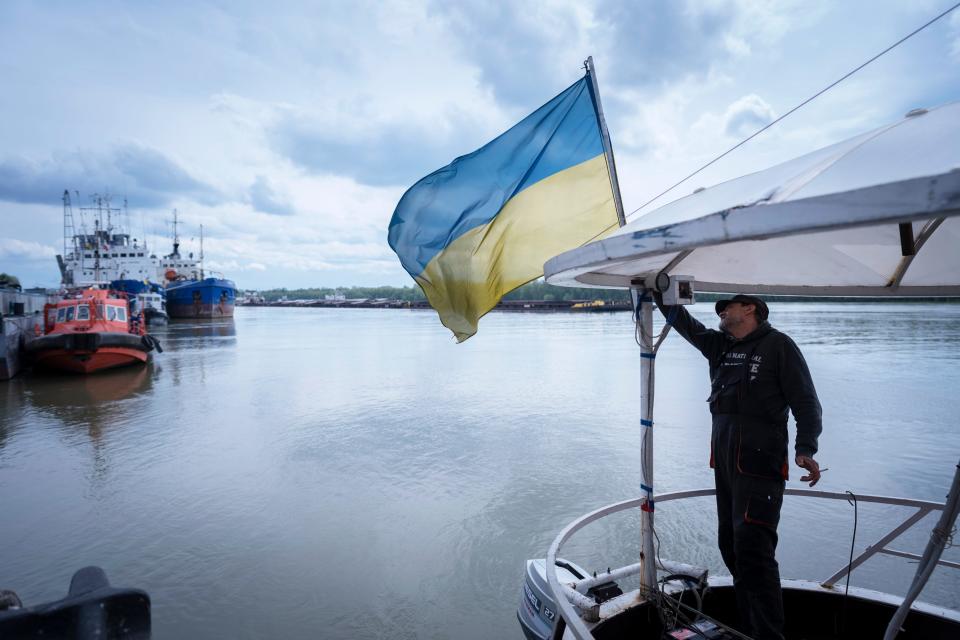Despite 'dim prospects,' battered but unbowed Ukraine fights on 2 years after invasion
Power outages are an almost daily occurrence across most of Ukraine. Infrastructure has been devastated by the relentless pounding of mortar and rockets. The economy, by most metrics Europe's weakest before the war, has been left in tatters.
The adversary, neighboring Russia, has three times the population, double the military budget and a president thoroughly committed to ending the war only on his own terms. The ally, the United States, has wavered between pledging support for "as long as it takes" and "as long as we can."
Two years into its brutal struggle, Ukraine fights on. But some experts warn the future is bleak for the battered nation of more than 40 million people, millions of whom have been displaced inside or outside the country. And there is no end in sight for the the wanton destruction of homes, businesses and schools that began with Russia's invasion on Feb. 24, 2022 ? and continues unabated today.
"Russia is playing the long game, and Ukraine is fighting for its continued existence," Mary Kate Schneider, director of global studies at Loyola University Maryland, told USA TODAY. "This a war of attrition that will not end anytime soon."
President Volodymyr Zelenskyy has pledged to regain all territory seized by Russia, estimated at almost 20% of Ukraine. But the eastern Ukrainian city of Avdiivka recently fell to Russian troops, marking the first major advance or retreat by either side in months. Ukraine's weary military remains starved for weapons and ammunition while U.S. lawmakers bicker over funding.
Steven Myers, an Air Force veteran who served on the State Department's Advisory Committee on International Economic Policy under two secretaries of state, warns that Ukraine’s military capability has been reduced to "tactical pinpricks" with little strategic relevance.
"It is an unqualified geopolitical catastrophe for the West. Ukraine has been destroyed as a viable nation," Myers told USA TODAY. "Depopulated, with hundreds of thousands of its precious youth dead and crippled, its industrial and agricultural foundations obliterated."
The West, and the Biden administration, are not giving up. Vice President Kamala Harris, at a joint news conference with Zelenskyy in Munich last week, pledged that she and President Joe Biden would continue efforts to secure the resources and weapons Ukraine desperately needs.
"We will work to make sure Russia pays damages to Ukraine," she said. "And ultimately, we want to see Ukraine emerge from this war as a nation that is free, democratic and independent."
Sean McFate, a professor at Syracuse University and senior fellow at the nonpartisan Atlantic Council think tank, says Russia is in position to dig in for years, waiting for the West to lose interest in Ukraine amid economic and other concerns.
"Ukraine cannot win a war of attrition with Russia," he said. "Russia has mostly won."

Death tolls as elusive as military gains
While both sides struggle to gain a battlefield edge, the death toll continues to rise. Neither side has been forthright in revealing casualty counts. Sen. Ron Johnson, R-Wis., in a recent Senate presentation, estimated that about 120,000 Russian soldiers have been killed in action and an additional 200,000 wounded. He estimated 70,000 Ukrainian soldiers have died along with 10,000-40,000 civilians. An additional 100,000-120,000 Ukrainians have been wounded, he said.
“Vladimir Putin is an evil war criminal. Make no mistake about it. We all agree on that," Johnson said of the Russian president. Johnson then explained his "no" vote against the aid bill: "The reality that I think a lot of my colleagues ... are ignoring is that Vladimir Putin will not lose this war."
Myers agrees that the dying will continue until "the West stops sending money" to Ukraine. Russia will never surrender, will never concede Crimea and will never allow Ukraine to join NATO, he says.
Russia has not been immune to the misfortunes of war. The economy has been hobbled by global sanctions. Hopes of quick victory when the war began have disappeared as casualties mount. And retired U.S. Vice Admiral Robert Murrett, deputy director of the Institute for Security Policy and Law at Syracuse, says Ukraine has "largely won" the battle of the Black Sea. The Russian Black Sea Fleet has been pushed back to the distant waters and "all of their facilities on Crimea and other locations are at risk."
Karolina Hird, an analyst at the Washington-based Institute for the Study of War, counsels urgency. Hird says Russian efforts to cleanse occupied Ukraine and make its occupation permanent are reversible, at least for now.
"The longer Russia is allowed to occupy Ukrainian lands the harder it will be to reintegrate them into Ukraine, to say nothing of the additional lives lost and irrevocably damaged in the meantime," she wrote in an institute report published this month. "The West must act decisively to help Ukraine, and it must act now."
Zelenskyy laboring to keep Western aid coming
Jeffrey Levine is a former U.S. ambassador to anxious Russian neighbor Estonia, a nation of less than 2 million people that ranks among Ukraine's strongest supporters. Its prime minister is on Russia's criminally "wanted" list after angering Putin for reasons that include pulling down Soviet-era World War II monuments.
But Estonia is a NATO member, and the alliance charter requires members to come to the aid of others that are attacked. That is a crucial protection Ukraine cannot claim. Levine says Zelenskyy is facing harsh realities of a non-NATO nation mired in a seemingly endless war, highly dependent on assistance from the preoccupied West.
"To Zelenskyy's credit he has kept the assistance flowing. But, after two years, donor fatigue and competing conflicts are taking a toll on Ukraine's support," Levine said. A $60 billion U.S. aid package has been ensnared in the partisan battles paralyzing Washington. Levine said presidential hopeful Donald Trump's "affinity for dictators" such as Putin and his disdain for international cooperation thicken the ominous cloud over Ukraine's future.
Photos show life in Ukraine before and after 2 years at war with Russia
'Unwavering' US support wavers
Unwavering support has been a recurring theme from Ukraine's supporters in the West. The State Department, in a fact sheet published in December, declared "unwavering support" for Ukraine’s sovereignty and territorial integrity. Biden, during his State of the Union address a year ago, pledged U.S. support "as long as it takes," a phrase repeated by Harris with Zelenskyy last week.
But the support is wavering. Funding that drew bipartisan rubber stamps in the war's early months is drawing intense scrutiny now. During a joint news conference with Zelenskyy in December, Biden acknowledged the congressional morass in promising military aid "as long as we can.”
Zev Faintuch, senior intelligence analyst at Global Guardian, a security firm with boots on the ground in Ukraine, says the loss of resolve is understandable as the war slogs on.
"No one is questioning the resolve of the Ukrainian people," Faintuch said. "But given the dim prospects of Ukraine achieving its political goals, the resolve of Ukraine’s Western benefactors is starting to erode."

For Europe and world, lessons learned?
Faintuch says the biggest surprise of the war has been Russia’s ability to produce and otherwise obtain weaponry. While truthful data is difficult to obtain, it's clear that Russia is able to produce shells and tanks much faster than the West anticipated, Faintuch said.
The war also provided a bleak picture of the West’s military industrial capacity ? or lack of it.
"One thing I think historians will take away from this war is that it marked a turning point in European defense," Faintuch said. "Europe is no longer content with freeloading. And eventually Germany will take its place as the chief actor in European defense."
The war shows that traditional, conventional war no longer works, McFate said. Russia's conventional blitzkrieg was beaten back by Ukrainian guerrillas. After four weeks, Putin shifted to unconventional war ? flattening cities and killing civilians.
"Ironically, Ukraine then decided to go conventional and demanded tanks and artillery from NATO with the promise of a spring, then summer, then fall offensive," McFate said. "It failed spectacularly because no one wins wars conventionally anymore."
Ukraine is a case study in "low strategic IQ" on all sides, McFate said. It matters little how much money and advanced weaponry you have without the strategic thinking to use them, he said.
"It should be a warning to NATO that expensive, conventional war weapons no longer deliver victory," McFate said. "Instead they win battles but lose wars ? think U.S. experiences in Vietnam, Iraq and Afghanistan. Other things win wars today, and some of the best weapons don’t fire bullets."
Trump shows little interest in challenging Russia
NATO received another warning about its future ? from Trump. The former president, during a South Carolina rally, criticized NATO countries that have failed to meet military funding goals. NATO members are asked to spend at least 2% of their GDP on defense, and the former president frequently criticizes nations that have fallen short.
Trump turned heads around the world this month when he recalled a conversation when he was in office, saying the leader of "a big country" asked him whether the U.S. would protect his nation if it was delinquent on its military spending goals but was attacked by Russia.
Trump's response was quick and to the point: "No, I would not protect you. ... In fact, I would encourage (the Russians) to do whatever the hell they want."
The former president's comments immediately drew backlash from NATO Secretary-General Jens Stoltenberg, who said Trump's attack could endanger both civilians and troops.
“Any suggestion that allies will not defend each other undermines all of our security, including that of the U.S., and puts American and European soldiers at increased risk," Stoltenberg said in a statement. "I expect that regardless of who wins the presidential election, the U.S. will remain a strong and committed NATO ally.”
Dids Donald Trump put troops at risk? NATO comment draw fire
Where do we go from here?
Neither side is likely to achieve a swift battlefield victory, so a negotiated settlement is increasingly becoming the solution, many experts agree. Zelenskyy does need to retain Western support to negotiate from a position of strength.
"In the short term, that means continued and robust military assistance for Zelenskyy while privately urging a solution," Levine said. "Putin and Russia must continue to face the political, economic, and diplomatic isolation necessary to convince them that Ukraine's sovereignty is not negotiable."
McFate says Russia will besiege Ukraine until its people eventually give up and elect a puppet of Moscow. Putin's ruthless suppression of domestic dissent has left him with few political concerns, putting time squarely on the Russian president's side.
"I think Zelenskyy’s days are numbered," McFate said. "He’s had a falling out with his military, over-promised and under-delivered to the West and will be blamed by the people if matters deteriorate. Plus, he must be exhausted."
Supply lines are crucial. If Ukraine can maintain a steady flow of munitions and supplies, its gritty troops can continue to fight. If the flow dries up, Ukraine will be in a very tenuous position, Schneider warned.
U.S. support will be key to keeping supply lines open, to keeping the troops armed and to allowing Ukraine to ultimately negotiate from a position of relative strength.
"The U.S. created this mess, and it is the U.S. that will have to lead the world out of it," Myers said.
This article originally appeared on USA TODAY: Ukraine: Will Russia's war against Ukraine ever end?
